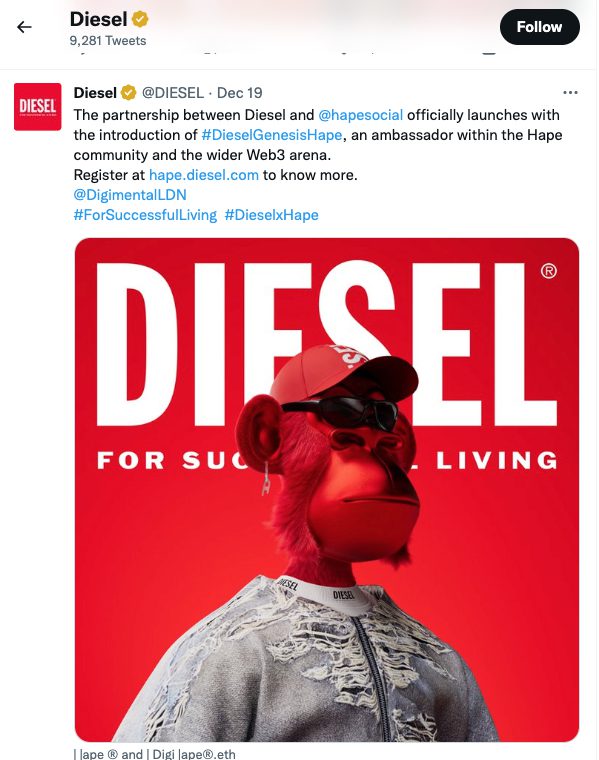Fashion brand Diesel has partnered with blockchain start-up Hape as part of its effort to strengthen its brand presence in the metaverse. The upcoming NFT collection is the second official Diesel NFT series after the successful launch of ‘D: VERSE’ earlier this year.
Digimental and Stefano Rosso will co-host a Twitter Spaces at 6 pm CET on January 25, 2023 to discuss the NFT collection and its perks in detail. At the time, little information about the collection has been provided, with more details expected to be disclosed on the dedicated website in early 2023. Per the fashion brand’s official Twitter account, “The partnership between Diesel and @hapesocial officially launches with the introduction of #DieselGenesisHape, an ambassador within the Hape community and the wider Web3 arena. Register at https://hape.diesel.com to know more.” What ew do know is that each NFT in the collection co-created by Diesel Creative Director Glenn Martens and Hape founder creator Digimental will offer both real-life and digital benefits. Diesel will first introduce Diesel Genesis Hape, the Diesel ambassador within the Hape community and the web3 space. What’s more, the NFT collection is expected to include a limited edition of the iconic 1DR POD crossbody bag and members will get access to exclusive events along with other exciting community benefits.

Diesel’s official Twitter account
The partnership is a win:win for both collaborators. While it paves the way for Diesel to establish its presence in the metaverse, Hape is focusing on strengthening its presence in the digital fashion space. And, why not? Per Forbes, ‘Sales of NFTs, according to a study by BoF Insights, were $10.7 billion in Q3 2021, more than 8 times the sales of the previous quarter, showing that the appetite for purchasing and owning digital assets is rapidly growing. Driven by a younger audience, their research showed that 72 per cent of US consumers have accessed a virtual world in the last 12 months, with 50 per cent of consumers expressing an interest in purchasing a digital asset.’
Jasmeen Dugal is Associate Editor at FashionABC, contributing her insights on fashion, technology, and sustainability. She brings with herself more than two decades of editorial experience, working for national newspapers and luxury magazines in India.
Jasmeen Dugal has worked with exchange4media as a senior writer contributing articles on the country’s advertising and marketing movements, and then with Condenast India as Net Editor where she helmed Vogue India’s official website in terms of design, layout and daily content. Besides this, she is also an entrepreneur running her own luxury portal, Explosivefashion, which highlights the latest in luxury fashion and hospitality.










